#signal hill: bishop
Text



time flies and isabel aged up to a child. with two dads who work long hours, she has a lot of alone time on her hands.
#she reminds me of marina fitch in that way#neil & erik are rly giving rudy & sawyer as well... maybe im predictable w my tropes lmao#simblr#ts2#the sims 2#sims 2#gameplay#hood: signal hill#signal hill 1.4#signal hill: bishop#signal hill: erik bishop#signal hill: neil summers#signal hill: isabel bishop
40 notes
·
View notes
Text
Stare Miasto Kraków Poland
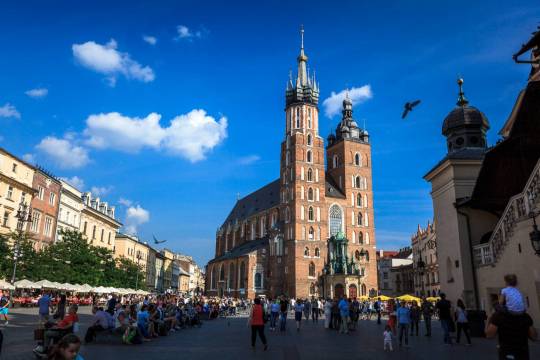
View On WordPress
#Bishop Stanislaus Patron Saint of Poland#Eyeless Head Sculpture Igor Mitoraj#Hejnał Mariacki Trumpet Signal#Igor Mitoraj Polish Artist and Sculptor#King Sigismund I the Old#Kraków Market Square#Kraków Old Town#Rynek Główny#Sigismund Bell#St. Mary&039;s Basilica Krakow#St. Peter & Paul&039;s Church Kraków#St. Stanislaus#Stare Miasto#Wawel Castle#Wawel Hill#Wawel Royal Cathedral
0 notes
Text
Through Flame and Flood - Chapter 1 (Felix x Reader)
Fandom: Fire Emblem Three Houses
Pairing: Felix x Reader (Gender Neutral)
Warnings: Graphic Depictions Of Violence, Major Character Death
Tags: #Angst and Hurt/Comfort #Blood and Injury #Canonical Character Death #Gender Neutral Reader #Enemies to Friends…Frenemies?
Chapters: 1/?
Words: 3178
Summary: Verdant Wind route, Great Tree Moon. Reader (Gender Neutral) is a member of the Golden Deer House by the start of Edelgard’s campaign. Felix was not recruited and thus follows Dimitri to Gronder to unleash vengeful fury upon Edelgard. Stationed between a hill and a hard place, you are unfortunate enough to get caught in the middle.
Notes: This fic will follow the events of Chapter 17 in the Golden Deer/Verdant Wind route, during the shitstorm of Gronder. Scenes of death and injury will be toned down where possible, but take caution all the same. Enjoy! -sir dorts
also available on ao3!
====================================================
You descended the field with practiced footfalls, making nary a sound as you closed in on a patch of trees dead ahead. Taking shelter in the wooded grove, you ducked low as the air above thundered with the wingbeats of wyverns and pegasi overhead - airborne soldiers in tight formation. Kingdom? Imperial? It hardly made a difference if they marked you an enemy.
The Battle of Gronder Field was nigh. The rest of your comrades were assembled north of the Airmid River, ready to march on Claude’s signal. You, however, were tasked with a different assignment.
Reaching for the bow strapped to your back, you recalled your Professor’s instructions.
“This concerns the Blaiddyd standard. I need you to keep eyes on whoever is flying it.”
Easy enough, right? Claude had made his position clear by uniting the Church of Seiros and the Leicester Alliance under a single banner. If Edelgard was determined to stamp out any remnants loyal to the Kingdom, it stood to reason that whoever was marching on behalf of House Blaiddyd would throw in their lot with the coalition.
Except that hasn’t happened. From this mysterious group, there were no overtures of an alliance. Even if Dimitri were somehow alive and leading this retinue, there was no way of knowing what designs he had on Gronder Field.
Your professor may as well have sent you behind enemy lines to chase ghosts. Ridiculous, you thought. And yet there was a knot of dread tightening in the pit of your stomach.
If they wanted to play nice with us and gang up against the Imperial Army, they would have said something by now. Sent a message. A hello, at the very least. All we’ve gotten from them is silence.
Silence that was somehow more ominous than Edelgard’s declaration of war five years ago.
Whoever they are, whatever they are planning, it’s obvious they’re not interested in coordinating.
You picked up the sound of faint explosions from the west, followed by the shouts of Imperial foot soldiers and the thunder of their march.
Shit. They’re ramping up already.
Taking position up behind a tree, you motioned for your companion to hurry up and do the same. Poor Marianne - a bishop’s habit was not constructed for stealthy movement through the overgrown field. You stared at her with equal parts pity and frustration as she hurried to your side.
The idea was hardly yours. It was Claude trying to fill in the gaps in his strategy, insuring you and your comrades against all the unknowns.
“Sorry to spring this on you right before sortie, but I need you and Marianne to hold that position east of the hill. If you remember how we won the Battle of the Eagle and Lion five years ago, then you know the one. I’ll find a way to make us even, I promise.”
No problem, Claude, you thought irritably. But you owe me a week of night patrol duty if I manage to survive this.
Could you even? Aileil had been horrid enough, now here you were stuck between a heavily contested area and an unknown band of soldiers.
Marianne must have sensed your unease, for she wore a look of guilt.
“…My apologies,” she murmured. “If any harm were to befall you, the fault would surely be mine.”
“Nonsense. I wouldn’t trust any other partner for this task,” you chastised her. “Don’t worry about what might or might not go wrong. Let’s try to support our friends and stay alive.”
“Y-Yes, of course. You’re right,” your companion nodded, drawing in a sharp breath to steel her nerves. “I must focus on keeping everyone safe.”
“That’s right. Just like the last time we were here,” you encouraged her. “Remember how you hid in the foliage and healed our wounds from afar while we took the central hill? And the look on Hubert’s face when you cast Silence on him!”
The glorious Battle of the Eagle and Lion. You and the Golden Deer had won the day. No doubt Claude was banking on that same trick from five years ago, except this time you would provide cover fire and prevent any errant forces pinching the main force from the east. Imperial, Kingdom, or otherwise.
She blushed, ducking her head down lower. “Please don’t remind me. I’m not certain if I could pull it off again. And I don’t know how brave I could be if I were to face off against Hubert now.”
“If we’re lucky, you won’t have to,” you told her grimly, tightening the string on your bow. “Just keep your eyes on the hill and use your magicks on anyone coming from that direction. I’ll keep tabs on the east in case that renegade troop decides to show their faces.”
“The ones marching under the Kingdom’s banner…” Marianne bit her lip before daring to ask. “You don’t think it could be…?”
You patted yourself down, counting the throwing knives stored on your person and making sure they were well within reach. “Dimitri? Dedue? The rest of the Blue Lions? They could be dead in a ditch for all we know…”
“I suppose,” Marianne mused, frowning at your cold remark. She flexed her fingers to keep them from trembling. “But…There’s still a chance that some of them managed to flee the Kingdom. Like, for example…”
“…who?”
Where her gaze was usually timid, there was now a strange intensity as her eyes met yours.
“Like Felix.”
In that moment you fell silent, rapt by a sudden flash in your memory. The clash of a wooden blade. The sand of the practice arena flying from beneath your heels. Dark hair, piercing eyes, and a familiar voice taunting insults that you couldn’t remember but still boiled your blood all the same. Blue skies above and your bruised knees beneath you. Your battered pride. An outstretched hand, unexpected, clasping yours and lifting you onto your feet.
There was a sting in your chest that you knew all too well, though dulled over the passing of years. You shook your head to purge your thoughts.
“Felix?” you scoffed. “Why him, of all people?”
“Wasn’t he your friend?”
A friend who was all too happy to let you know how garbage you were at wielding a blade.
“…I sparred with him maybe once or twice,” You mumbled lowly. “We weren’t even in the same House. I wouldn’t exactly call him my friend.”
“A-are you sure?” Marianne asked, eyes wide with confusion. “But the two of you were always… Back then, it always looked as though-” She cut herself off. “Never mind… I probably got the wrong idea…”
The wrong idea? About what?
You wanted to press the subject further, but there was no time to reminisce about carefree days long gone. Not when the very field you stood upon was about to erupt into a battleground.
“It’s fine,” you breathed, feeling your nerves hitch. “It’s gonna be fine, we’ll be fine. Just follow Claude’s playbook. Break the blockade, rush the artillery station, use long-range fire to suppress the Imperials, cover the advance guard…”
Easy both said and done, right? But luck would have it otherwise.
“… Something’s wrong,” Marianne uttered, her stare intense.
You narrowed your gaze towards the east. “What, the Kingdom army? Are they here already? I don’t see anyone approaching…”
Marianne shook her head. “No. The hill. Something’s different. Did they do something to it?”
You glanced over your shoulder, frowning. Sure enough, there was the central hill, with the artillery station mounted at its apex. Someone was seated there, but you were unable to discern their features from this distance.
“They may have done something with the ballista,” you reasoned, shifting your position to get a better look. “I mean, if they anticipate us coming up the hill, it would make sense to occupy it first-”
Something was making the soles of your boots stick to the ground, like you had stepped in glue. Except the smell of it made your nose burn.
“Why is the ground all sticky?” Marianne asked, lifting the hem of her skirts. There was a black stain that wasn’t there before.
Keeping one eye on the turret, you dared a few steps toward the hill. Quick and quiet, in spite of the strange liquid clinging to your soles. Crouching down, you rubbed your gloved fingers against the ground, catching grass and more of that sticky substance. Was the hill… dripping?
Then it clicked. Your nose stung with the scent of something dark and bitter, like tar. A hint of pine, but also something more noxious. In an instant, you recalled the explosive noises further afield. Your eyes lifted towards the hill and widened as you realized in horror the depth of Edelgard’s scheming.
The entire hillside was slick and glistening - with foul, putrid-smelling, volatile pitch.
Horrified, you turned a heel and darted back into the trees where Marianne was waiting fretfully.
“Get back! Away from the hill!” you hissed. “They’re going to burn it! We have to warn the others!”
You grabbed Marianne’s arm, pulling her along with you. Just as you were wondering, frantic, how to communicate Edelgard’s plan to Claude and the Professor, there was a sudden clamor from the treetops above.
A pegasus descended from the skies, landing on its hooves with an impact that made the ground tremble, majestic wings spread in a threatening stance.
As you fumbled for an arrow in your quiver, a lance was brandished in your direction. Adorning it was an elaborate spearhead that glowed like embers, set with a sigil you had seen before.
“In the name of his Highness, make way!” a familiar voice ordered. “Or die where you stand.”
Marianne’s eyes widened in shock, recognizing the rider before you did. “I-Ingrid?”
Flooded with disbelief, you struggled to make sense of the situation. The pegasus reared, threatening to charge. Instinctively, you shoved Marianne out of the way and darted to the side as Ingrid surged past. Nocking an arrow to your bow, you drew the string back, taking careful aim.
“Ingrid, stop! Or I’ll shoot!” You had no desire to open fire on your former schoolmate, but if she forced your hand…
Suddenly, you picked up movement from the corner of your eye, the sound of someone sprinting through the grass, charging in your direction. You whirled around and let the arrow fly towards your new assailant.
Felix uttered a noise of rage and let his blade fall early, cutting the arrow down mid-flight before it could make its mark. The split-second that followed was just enough time for you to dive towards the trees.
“Try that again and I’ll make you pay!” he snarled, angling his blade for another attack. You ducked behind a branch as he lunged. Steel struck wood instead of flesh, sending bits of bark flying.
Glancing over your shoulder, you caught a glimpse of his face. Where there was once a cold smugness, there was something different in his eyes. Anger, loathing, and bitter desperation.
You left him to contend with the fallen branch as you darted back the way you came, searching for Marianne. All the while you prayed, just prayed that he would let up-
The singing of metal filled your ears as something caught your shoulder, sinking into flesh and slicing across. Of course he wouldn’t.
Reaching for your belt, you detached a throwing knife and flung it at him. Felix ducked and brought his arm up. A shield flared with crackling energy, deflecting the knife into the grass.
You let out a cry of frustration. That’s so not fair.
As you braced yourself for another strike, the one that could end you, the temperature around you suddenly plunged. Felix must have sensed it too, for he halted in his tracks. His labored breath turned to mist in the icy air.
This time it was his turn to back away as flowers of frost formed at your feet, snapping the grass underfoot. The earth buckled and burst as massive spikes of ice jutted outwards, forming a treacherous barricade before you.
By your side stood Marianne, panting with exertion, outstretched palms awash in a blue glow. Pride surged in your chest. As Felix deliberated whether to risk impaling himself upon the ice or carve another path forward, your ears picked up the shriek of a pegasus descending from somewhere above.
You stepped in front of Marianne and nocked another arrow, this time aiming upwards. This forced Ingrid to veer away sharply instead of diving at you both. Her pegasus jerked violently in mid-air, coming short of crashing into the trees. Excellent. This gave you enough time to think and-
Something burst through the icy barricade, splitting it apart as though it were a gate dashed upon a battering ram. You brought your arm up to shield your eyes from the flying shards of glass. A towering figure forced its way through the ruined barrier, armed with a lance that glowed like Ingrid’s relic, but like none you had ever seen before.
The crest that flared in mid-air before you, however, you recognized as that of Blaiddyd.
It couldn’t be, you thought, eyes wide. He should be dead.
Yet there he was in the flesh, though he reminded you more of a beast than human. Prince Dimitri of the former Kingdom of Faerghus. His massive shadow loomed as he peered down at you coldly with a single eye. The other was concealed behind a black patch.
At his side was Dedue, smashing down the remaining ice with his great-axe to clear a path for his lord. Felix emerged through the opening, as did Ingrid. All four of them moved to surround you both. Their eyes were filled with menace. But why? These were your schoolmates! Though from different classes, all of you had studied together. Trained together. Laughed and argued over meals in the dining hall. Spent the passing seasons together within the same walls. Why did they look upon you now as though you were an enemy? Scarcely a person, more an obstacle to be cut down?
“Run. Find Claude and the professor,” you ordered Marianne, shoving her away behind you before she could protest.
She tried anyway. “But-”
“GO! HURRY!” you snapped with a forcefulness that sent her running towards the Airmid, as fast as she could manage.
You pitted yourself between Marianne and the former Blue Lions, preventing them from giving chase. As they surrounded you with weapons at the ready, you immediately dropped your bow and raised both arms into the air. Your shoulder blade stung from the shallow cut Felix had inflicted earlier.
“Stand down!” you yelled, thinking fast. “We’re not Imperial soldiers! We’re part of the coalition between the Church and the Alliance! There’s no reason for us to fight!”
You felt the press of cold steel against your neck.
“Drop your knives,” Felix warned, adjusting the grip of his sword. “All of them. I won’t say it twice.”
Daintily, you reached down and plucked the knives attached to your belt one-by-one, dropping them into the grass. All the while you shot Felix a look of pure venom. Asshole.
“We’re wasting time,” Dimitri growled, brushing past without deigning to look at you. “Cut this one down and move. We take the hill.”
Your eyes went wide as you suddenly remembered.
“You can’t,” you warned, turning your head towards Dimitri as far as Felix’s blade would allow. “It’s rigged. Edelgard is going to set it on fire. You’ll never make it to the other side.”
Without meeting your eyes, Dimitri swung his lance at you, stopping short of slicing your chest open. “You claim to be no ally of the Empire, yet you are privy to Edelgard’s plans?”
He snarled her name with a baleful hatred that chilled you to the core. “Which is it?! I’ve no patience for lies!”
“I’m not lying!” you insisted, mustering courage as the spearhead pressed into your chest. “The entire hill is covered in pitch! You can check for yourself.”
You noticed Felix suddenly glancing down at his feet, the same way you had when you first discovered the ruse. Dimitri continued to stare dead ahead towards the hill, paying no heed. His lips curled into a sneer.
“It matters not. We’ll cut our way through the flames if we must. No matter how many stand in our path, Alliance or Imperial, we will crush them all the same. Edelgard will pay for her sins.”
His words left you numb with disbelief. This was Dimitri? The earnest and wholesome boy who treated everyone around him with the highest courtesy, never expecting the same in kind? Or was this the boar you heard Felix muttering about once in passing? Only now did you begin to understand what he had meant that day.
“That’s insane. Claude is not your enemy!” you insisted, too caught up in your emotions to realize that the blade against your neck was no longer there. “We should be coordinating our attacks, not fighting each other like this! Stop and think for a second!”
“Enough! You will be silent!” Dimitri roared, rearing back his lance to deliver the killing blow himself. You stared into the eyes of your would-be murderer and saw no humanity, only torment. Eyes filled with bloodthirst. A monster, depraved beyond all redemption, feasting upon pain and terror in the battlefield.
You wondered how in the world this could have happened. What made him into this thing. How could you have met your end at the hands those who could have once been your friends.
As you waited for death, Felix spoke up. “Hold it. I have a better idea.”
He shoved you viciously towards the hill, almost causing you to stumble. “Why don’t you take the lead? Might make a good shield.”
You sneered incredulously, but did not argue. How kind of Felix to convince Dimitri to spare you, only to march you into the flames. Better than instant decapitation, you supposed.
“At least let me grab my bow.”
Dimitri withdrew his lance and whirled, marching off in the western direction. He had ceased to care. Ingrid and Dedue followed obediently, the same deadpan stare in their eyes. Felix remained, his blade hovering inches above your head as you crouched down to retrieve your bow. Half your knives lay scattered upon the ground, but you dared not even look at them for fear of testing the swordsman’s generosity.
Felix spoke in a low voice, unheard by all except you. “If you see a chance, take it and run.”
You said nothing and straightened your back, bow in hand.
His blade pressed into your spine. “Start walking. Move.”
You obeyed, keeping pace with your captors. Felix urged you faster, forcing you to take point and lead the climb up the hill. You tensed, ready to meet death by artillery fire or burning pitch - whichever came first. Yet despite whatever misgivings you felt in the moment, you had the sense that Felix liked these circumstances even less than you did.
11 notes
·
View notes
Text
* ◞ ╰ closed starter / alana’s family home in beverly hills . @cvmeron

surely , it’s not the first time cam has called her absolutely wasted off his mind in the middle of the night , but with the given turn of events & him becoming a father in just a couple of months , she doesn’t have any spare room to even judge him . which also explains why she makes sure her father’s driver picks him up from the club , waiting for the car to appear while sitting on her front porch . luckily , her father’s away on business , which also makes it easier for cam to come over without elijah bishop breathing down their necks . as soon as the car pulls up & cam stumbles out , alana makes her way over , signaling to alfred that she’s got this under control . ❝ hey , hey , you alright ? ❝ she asks , her hands around him to keep him steady as her free hand combs through his sticky hair . ❝ you’re all STICKY , did you bathe in sugar ? ❝ she jokes .
7 notes
·
View notes
Note
#TeamKate all the way!
The 5.6k of pain was primarily Yelena’s POV. We got to sit in the room and cry with her after every heartbreaking interaction, BUT Kate went through a whole year of moments like that and Yelena was seemingly oblivious to it?????
We don’t know how if Kate tried to talk about her feelings. We do know her actions showed she was trying to shoulder the marriage for the year.
It’s Yelena’s world and Kate’s just living in it.
Pops’ over there in the corner cackling because we’re feeling bad for Yelena, but I have a feeling Kate is about to get GUTTED in this next update and we’ll be crying in bed with her next! (Or getting our stomachs pumped in the ER with alcohol poisoning)
Yelena kept saying “I don’t want this.” during the initial fight, but only after she realizes how seriously hurt Kate was. It was almost like she was trying to convince herself that strictly focusing on her studies isn’t what she wanted all along. Not to mention before they got engaged Yelena kept suggesting they ‘take a break’. This isn’t a new thing for Yelena.
and SHE HESITATED! I’ll die on that hill lol
I still think Kate is her priority, but smol science queen has had her life planned from the time she was little. And we know how our girl LOVES a plan. Dumb frat boi (wifed up or not) is fucking with that plan!
KATHERINE E BISHOP showed up in Boston to see Yelena! Yes, she sent some super mixed signals while she was there, but it was a spontaneous decision! That’s Kate! She jumps into shit on a whim and figures it out on the fly.
Yelena fucked up for a year. Kate sentenced her to half that much time. Seems pretty fair. That’s petty af. I’m aware. It’s my toxic trait. Leave me be.
Not to mention Kate is being entirely selfless here. She’s playing the long game. She doesn’t want Yelena resenting her or sacrificing on Kate’s behalf. Even though Kate didn’t hesitate to risk her job and play hardball during her contract negotiation so she could spend more time with bae. Now bae’s like, “nah, you annoying. I got shit to do. Go away.”
Weirdly enough not much changes in Yelena’s world. The difference is now she’s aware of Kate hurting. It gives her the ick. She realizes maybe Kate’s attention isn’t that annoying. Maybe she overlooks everything Kate brings to their relationship because she’s also a big dumb puppy and sometimes that means not being taken seriously. Taking her seriously now though aren’t you!!?!??
I may have gone in on Yelena a little hard here… but fuck it… I stand by it.
…unless Kate doesn’t clutch up and to the cabin for their anniversary. In which case I will flip sides faster than Kate getting flipped on her back on their last night in Madrid…
FASTER THAN KATE GETTING FLIPPED ON HER BACK ON THEIR LAST NIGHT IN MADRID JDKSJDJNDMWNFKEFNKENFKEMFKEFKFMGKD
5 notes
·
View notes
Text
On this day in Wikipedia: Monday, 5th February
Welcome, velkommen, 欢迎 (huānyíng), tervetuloa 🤗
What does @Wikipedia say about 5th February through the years 🏛️📜🗓️?

5th February 2023 🗓️ : Death - Pervez Musharraf
Pervez Musharraf, Pakistani military officer and politician, 10th President of Pakistan (b. 1943)
"Pervez Musharraf (11 August 1943 – 5 February 2023) was a Pakistani military officer and politician who served as the tenth president of Pakistan from 2001 to 2008. He also served as the 10th Chairman of the Joint Chiefs from 1998 to 2001 and the 7th Chief of Army Staff from 1998 to 2007. Born in..."

Image licensed under CC BY-SA 2.0? by World Economic Forum
5th February 2019 🗓️ : Event - Pope Francis
Pope Francis became the first pope to celebrate a papal Mass in the Arabian Peninsula.
"Pope Francis (Latin: Franciscus; Italian: Francesco; Spanish: Francisco; born Jorge Mario Bergoglio; 17 December 1936) is the head of the Catholic Church, the bishop of Rome and sovereign of the Vatican City State. He is the only pope to be a member of the Society of Jesus (Jesuits), the only one..."

Image by
File:Portrait of Pope Francis (2021).jpg: Presidenza della Repubblica
derivative work: Samuele1607
5th February 2014 🗓️ : Death - Robert Dahl
Robert Dahl, American political scientist and academic (b. 1915)
"Robert Alan Dahl (; December 17, 1915 – February 5, 2014) was an American political theorist and Sterling Professor of Political Science at Yale University. He established the pluralist theory of democracy—in which political outcomes are enacted through competitive, if unequal, interest groups—and..."

Image by Unknown authorUnknown author
5th February 1974 🗓️ : Birth - Michael Maguire (rugby league)
Michael Maguire, Australian rugby league player and coach
"Michael Maguire (born 5 February 1974) is an Australian professional rugby league football coach and former player who last coached New Zealand at international level. He played as a fullback, winger and centre in the 1990s. After a playing career spent mostly at the Canberra Raiders, with a brief..."

Image licensed under CC BY-SA 2.0? by https://www.flickr.com/photos/radar286/
5th February 1924 🗓️ : Event - Royal Observatory, Greenwich
The Royal Greenwich Observatory begins broadcasting the hourly time signals known as the Greenwich Time Signal.
"The Royal Observatory, Greenwich (ROG; known as the Old Royal Observatory from 1957 to 1998, when the working Royal Greenwich Observatory, RGO, temporarily moved south from Greenwich to Herstmonceux) is an observatory situated on a hill in Greenwich Park in south east London, overlooking the River..."
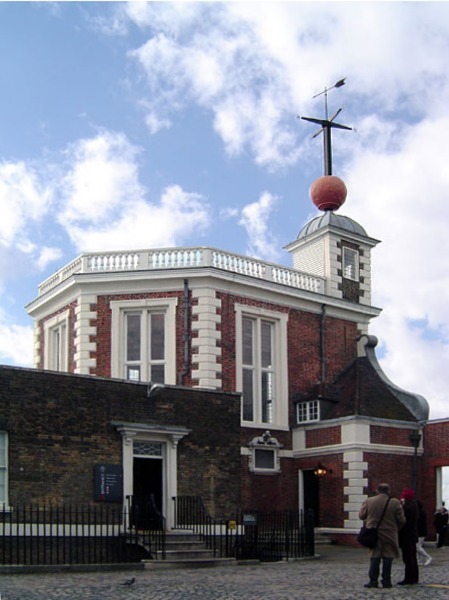
Image licensed under CC BY-SA 3.0?
5th February 1818 🗓️ : Event - Charles XIV John
Charles XIV John (pictured) succeeded to the thrones of Sweden and Norway as the first monarch of the House of Bernadotte.
"Charles XIV John (Swedish: Karl XIV Johan; 26 January 1763 – 8 March 1844) was King of Sweden and Norway from 1818 until his death in 1844 and the first monarch of the Bernadotte dynasty. In Norway, he is known as Charles III John (Norwegian: Karl III Johan) and before he became royalty in Sweden,..."
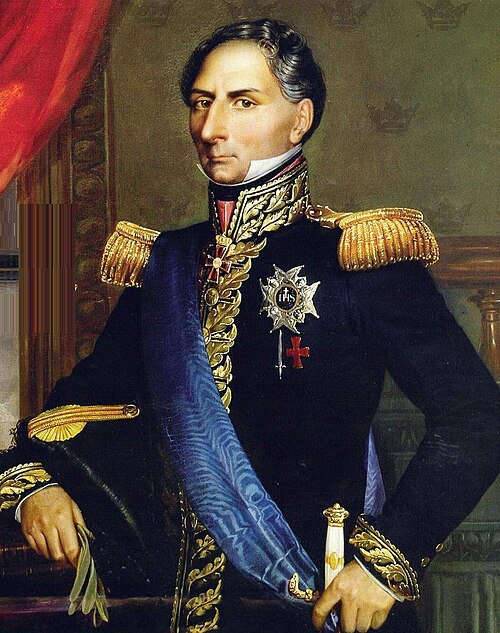
Image by
Emile Mascré
5th February 🗓️ : Holiday - Kashmir Solidarity Day (Pakistan)
"Kashmir Solidarity Day (Urdu: یوم یکجہتی کشمیر) or Kashmir Day is a national holiday observed in Pakistan on 5 February annually. It is observed to show Pakistan's support and unity with the people of Indian-administered Jammu and Kashmir and Kashmiri separatists' efforts to secede from India, and..."

Image licensed under CC BY-SA 3.0? by Khalid Mahmood
0 notes
Text
Events 9.15 (before 1950)
994 – Major Fatimid victory over the Byzantine Empire at the Battle of the Orontes.
1440 – Gilles de Rais, one of the earliest known serial killers, is taken into custody upon an accusation brought against him by Jean de Malestroit, Bishop of Nantes.
1530 – Appearance of the miraculous portrait of Saint Dominic in Soriano in Soriano Calabro, Calabria, Italy; commemorated as a feast day by the Roman Catholic Church 1644–1912.
1556 – Departing from Vlissingen, ex-Holy Roman Emperor Charles V returns to Spain.
1762 – Seven Years' War: Battle of Signal Hill.
1776 – American Revolutionary War: British forces land at Kip's Bay during the New York Campaign.
1789 – The United States "Department of Foreign Affairs", established by law in July, is renamed the Department of State and given a variety of domestic duties.
1794 – French Revolutionary Wars: Arthur Wellesley (later Duke of Wellington) sees his first combat at the Battle of Boxtel during the Flanders Campaign.
1795 – Britain seizes the Dutch Cape Colony in southern Africa to prevent its use by the Batavian Republic.
1812 – The Grande Armée under Napoleon reaches the Kremlin in Moscow.
1812 – War of 1812: A second supply train sent to relieve Fort Harrison is ambushed in the Attack at the Narrows.
1813 – Followers of the Eight Trigram Sect loyal to Lin Qing attack the Forbidden City in a failed attempt to oust the Jiaqing Emperor of the Qing Dynasty.
1816 – HMS Whiting runs aground on the Doom Bar.
1820 – Constitutionalist revolution in Lisbon, Portugal.
1821 – The Captaincy General of Guatemala declares independence from Spain.
1830 – The Liverpool to Manchester railway line opens; British MP William Huskisson becomes the first widely reported railway passenger fatality when he is struck and killed by the locomotive Rocket.
1835 – HMS Beagle, with Charles Darwin aboard, reaches the Galápagos Islands. The ship lands at Chatham or San Cristobal, the easternmost of the archipelago.
1862 – American Civil War: Confederate forces capture Harpers Ferry, Virginia (present-day Harpers Ferry, West Virginia).
1873 – Franco-Prussian War: The last Imperial German Army troops leave France upon completion of payment of indemnity.
1894 – First Sino-Japanese War: Japan defeats Qing dynasty China in the Battle of Pyongyang.
1915 – New Culture Movement: Chen Duxiu establishes the New Youth magazine in Shanghai.
1916 – World War I: Tanks are used for the first time in battle, at the Battle of the Somme.
1918 – World War I: Allied troops break through the Bulgarian defenses on the Macedonian front.
1935 – Nazi Germany adopts a new national flag bearing the swastika.
1940 – World War II: The climax of the Battle of Britain, when the Luftwaffe launches its largest and most concentrated attack of the entire campaign.
1942 – World War II: U.S. Navy aircraft carrier USS Wasp is sunk by Japanese torpedoes at Guadalcanal.
1944 – Franklin D. Roosevelt and Winston Churchill meet in Quebec as part of the Octagon Conference to discuss strategy.
1944 – Battle of Peleliu begins as the United States Marine Corps' 1st Marine Division and the United States Army's 81st Infantry Division hit White and Orange beaches under heavy fire from Japanese infantry and artillery.
1945 – A hurricane strikes southern Florida and the Bahamas, destroying 366 airplanes and 25 blimps at Naval Air Station Richmond.
1947 – Typhoon Kathleen hit the Kantō region in Japan killing 1,077.
1948 – The Indian Army captures the towns of Jalna, Latur, Mominabad, Surriapet and Narkatpalli as part of Operation Polo.
1948 – The F-86 Sabre sets the world aircraft speed record at 671 miles per hour (1,080 km/h).
0 notes
Text
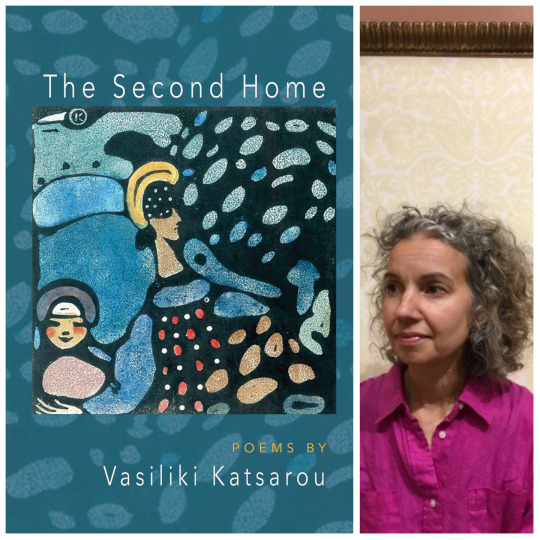
FLP CHAPBOOK OF THE DAY: The Second Home by Vasiliki Katsarou
ADVANCE ORDER: https://www.finishinglinepress.com/product/the-second-home-by-vasiliki-katsarou/
What is the first #home? Where one is born? The motherland of one’s ancestors? Or is our home in the imagination?
Weaving image and abstraction, the lapidary poems in THE SECOND HOME address questions of #memory and #inheritance, and of what gets passed on to the next generation. A signature poem in this collection, “Change, but Who’s Counting” may be read as a response to Jack Gilbert’s poem “Highlights and Interstices”: We think of lifetimes as mostly the exceptional/and sorrows… But the best is often when nothing is happening. …Our lives happen between/the memorable.
Vasiliki Katsarou, poet, editor, publisher, and filmmaker, is the author of the full-length collection, Memento Tsunami, and a chapbook, Three Sea Stones. Her poems have been published widely and internationally, and also in Greek translation. A Geraldine R. Dodge poet, she serves as a teaching artist in New Jersey, where she often collaborates with visual artists. She is a founder of two popular community poetry reading series, and now a small press, Solitude Hill Press.
PRAISE FOR The Second Home by Vasiliki Katsarou
What is home? In Bishop’s poem “Questions of Travel”, she asks, “Should we have stayed at home, wherever that may be?” Vasiliki Katsarou inhabits at least two homes in The Second Home, though one senses there are many homes, many mansions, being referenced in these spare and emotionally honest poems: memory, imagination, personal history, family history, offspring—all such phenomena operate as homes for the mind. Home is also language, and Katsarou herself lives and works in a trilingual world of Greek, French and English. In a short poem called “Germinal”, referencing the seventh month of the French Revolutionary calendar, she notices how “in spring/lines become volumes” and how “now things must be accounted for/in at least three dimensions.” In the poem, “We Would Wed Our Words,” Katsarou writes “if language is static/it is to prevent us from hearing a true signal//if language is a tool/to wedge us into an economy of wants//why yes, there is an endless supply of demand.” Katsarou’s poetry is rich in such signals.
–Regan Good, author of The Needle and The Atlantic House
What pleasure it has been to discover the fresh voice of poet Vasiliki Katsarou. The author of the poems in The Second Home sounds like no other. I savored her resonant phrasing and stunning use of metaphor, as in the poem “Ekta-chrome”: “last look upon home,/a café on the village square, the field, its harvest of exile//pellucid Pelasgia/partial coinage of a man-made image”. I found this work compelling in its movement as it gathers up the fragments of a glimpsed past and future, home and exile, and transfigures them into a new vision.
–Nicholas Samaras, author of Hands of the Saddlemaker, and American Psalm, World Psalm
These poems by Vasiliki Katsarou are elusive. Like water trickling through fingers they seep in, slip away, go somewhere unexpected. They aren’t confined to the page. They have the lingering effect of a ghazal, where the experience of reading them is added to the poem itself. There is no quibbling with Katsarou’s craft- the internal rhyme, the generous spaces surrounding stanzas, establish an unmistakable cadence. These poems are not for a lazy reader. They invite attention and rereading, and reward those who do.
–MaryAnn L. Miller, author of Locus Mentis and Cures for Hysteria
Please share/please repost #flpauthor #preorder #AwesomeCoverArt #poetry #chapbook #read #poems #home
0 notes
Text
Saints&Reading: Sunday, January, 29, 2023
january 29_january 16
THE VENERATION OF THE VENERABLE CHAINS OF THE HOLY APOSTLE PETER
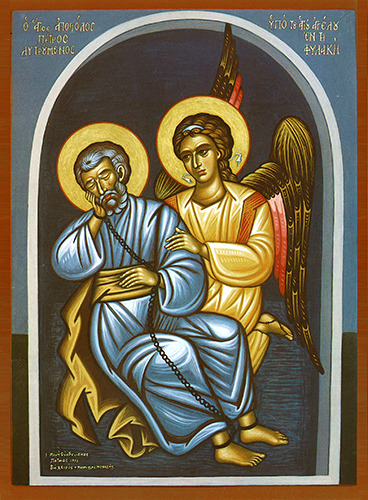
The Veneration of the Honorable Chains of the Holy and All-Praised Apostle Peter: In about the year 42, on the orders of Herod Agrippa, the Apostle Peter was thrown into prison for preaching about Christ the Savior. In prison he was held secure by two iron chains. During the night before his trial, an angel of the Lord removed these chains from the Apostle Peter and led him out from the prison (Acts 12:1-11).
Christians who learned of the miracle took the chains and kept them as precious keepsakes. For three centuries the chains were kept in Jerusalem, and those who were afflicted with illness and approached them with faith received healing. Patriarch Juvenal (July 2) presented the chains to Eudokia, wife of the emperor Theodosius the Younger, and she in turn transferred them from Jerusalem to Constantinople in either the year 437 or 439.
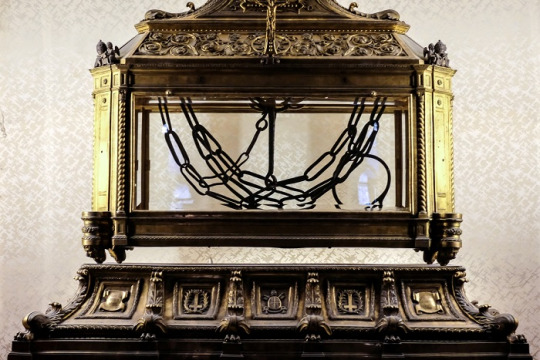
Eudokia sent one chain to Rome to her daughter Eudoxia (the wife of Valentinian), who built a church on the Esquiline hill dedicated to the Apostle Peter and placed the chain in it. There were other chains in Rome, with which the Apostle Peter was shackled before his martyrdom under the emperor Nero. These were also placed in the church.
On January 16, the chains of Saint Peter are brought out for public veneration.
SAINT HONORATUS ARCHBISHOP OF ARLES AND FOUNDER OF LERINS MONASTERY (429)
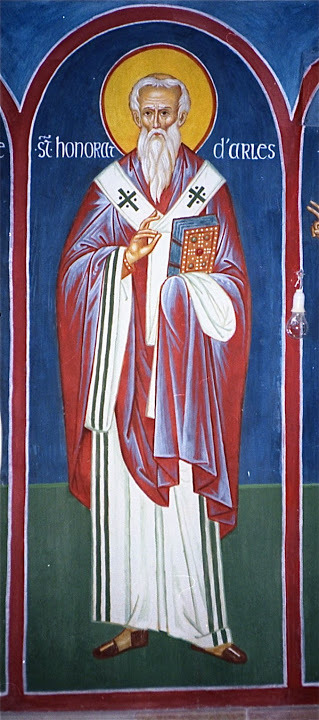
Saint Honoratus was born in Gaul (modern France) about 350, and came from a distinguished Roman family. After a pilgrimage to Greece and Rome, he became a hermit on the isle of Lerins, where he was joined by Saints Lupus of Troyes (July 29), Eucherius of Lyons (November 16), and Hilary of Arles (May 5), among others.
The saint depleted his youthful vigor through fasting and asceticism, and so “the powers of the body made way for the power of the spirit.” Though in poor health, he managed to follow the same rule of fasting and keeping vigil as those who were younger and stronger than he. He would visit the sick when he was even sicker than they were, offering consolation for body and soul. Then, fearing he had not done enough for them, he would review each case in his mind to determine how he could ease their suffering.
Adorned with virtues, Saint Honoratus treated a variety of spiritual diseases, freeing many from their enslavement to vice. His insight into each person’s character enabled him to apply the appropriate remedies for restoring souls to spiritual health.
Saint Honoratus died in 429 shortly after being consecrated as Bishop of Arles. Saint Hilary, his relative and successor, delivered a eulogy which still survives.
Source all texts: Orthodox Church in America


LUKE 19:1-10
1Then Jesus entered and passed through Jericho. 2 Now behold, there was a man named Zacchaeus who was a chief tax collector, and he was rich. 3 And he sought to see who Jesus was, but could not because of the crowd, for he was of short stature. 4 So he ran ahead and climbed up into a sycamore tree to see Him, for He was going to pass that way. 5 And when Jesus came to the place, He looked up and saw him, and said to him, "Zacchaeus, make haste and come down, for today I must stay at your house." 6 So he made haste and came down, and received Him joyfully. 7 But when they saw it, they all complained, saying, "He has gone to be a guest with a man who is a sinner."8 Then Zacchaeus stood and said to the Lord, "Look, Lord, I give half of my goods to the poor; and if I have taken anything from anyone by false accusation, I restore fourfold."9 And Jesus said to him, "Today salvation has come to this house, because he also is a son of Abraham; 10 for the Son of Man has come to seek and to save that which was lost.
Note: This Gospel part, signal the Sunday of Zachaeus. Therefore we know that Great lent is approaching, The following Sunday the Triodon will starts which opens the pre-lenten period the longest fast of the year.
ACTS 12:1-11
1Now about that time Herod the king stretched out his hand to harass some from the church. 2 Then he killed James the brother of John with the sword. 3 And because he saw that it pleased the Jews, he proceeded further to seize Peter also. Now it was during the Days of Unleavened Bread. 4 So when he had arrested him, he put him in prison, and delivered him to four squads of soldiers to keep him, intending to bring him before the people after Passover. 5 Peter was therefore kept in prison, but constant prayer was offered to God for him by the church. 6 And when Herod was about to bring him out, that night Peter was sleeping, bound with two chains between two soldiers; and the guards before the door were keeping the prison. 7 Now behold, an angel of the Lord stood by him, and a light shone in the prison; and he struck Peter on the side and raised him up, saying, "Arise quickly!" And his chains fell off his hands. 8 Then the angel said to him, "Gird yourself and tie on your sandals"; and so he did. And he said to him, "Put on your garment and follow me." 9 So he went out and followed him, and did not know that what was done by the angel was real, but thought he was seeing a vision. 10 When they were past the first and the second guard posts, they came to the iron gate that leads to the city, which opened to them of its own accord; and they went out and went down one street, and immediately the angel departed from him. 11 And when Peter had come to himself, he said, "Now I know for certain that the Lord has sent His angel, and has delivered me from the hand of Herod and from all the expectation of the Jewish people."
#orthodoxy#orthodoxchristianity#easternorthodoxchurch#originofchristianity#spirituality#holyscriptures#bible#gospel#wisdom
1 note
·
View note
Photo

Capital from Rome to Byzantium
The removal of the imperial capital from Rome to Byzantium was one of the most decisive acts on record — a signal monument of foresight, genius, and will. Madrid, St. Petersburg, Berlin, are also capital cities created by the act of a powerful ruler. But none of these foundations can compare in scale and in importance with the tremendous task of moving the seat of empire a thousand miles to the East, from the centre of Italy to the coast of Asia, from a Latin to a Greek city, from a pagan to a Christian population.
The motives which impelled Constantine to this momentous step were doubtless complex. Since the time of Trajan, Rome had not been the constant residence of the Emperors, except of Antoninus Pius, nor the regular seat of government. Since the time of Diocletian, Rome had been abandoned as the official centre of the empire. Many places east of it had been tried; and Constantine, when resolved on the great change, seriously contemplated two, if not three local ephesus tour guides, other sites. It had long been agreed that the imperial seat must be transferred towards the East; and there was an instinctive sense that the valley of the Tiber was no longer safe from the incessant onward march of the Teutonic nations in arms.
Asia Minor and the Euphrates
The tendency was to get somewhere south of the Danube, and within reach of Asia Minor and the Euphrates. The greater chiefs had all felt that the empire must be recast, both politically and spiritually. By the fourth century it was clear that the empire must break with the rooted prejudices that surrounded the Senate of Rome and the gods of the Capitol. And Constantine, the halfconscious and half-convinced agent of the great change — the change from the ancient world to the modern world, from polytheism to Christianity—saw in the Church and Bishop of Rome a power which would never be his creature. Dante tells us that ‘ Caesar became a Greek in order to give place to the Roman pastor.’ There is much in this: but it is not the whole truth, for Caesar might have become a Spaniard, or a Gaul, or an Illyrian. Dante might have added that Caesar became an Oriental, in order to give place to the Goth. Constantinople from the first was a Christian city, with an orthodox Church; but it was a Church that was, from the first, a department of the State.
The topography, apart from the geography of Constantinople, may demand some words; for the history of the city from Constantine to Abdul Hamid is based on its physical characters. We cannot doubt that the many delights of this spot, the varied resources of the surrounding country, the combination of sea, bay, mountain, valley, terrace, and garden, as these rise one beyond the other, have made Constantinople for fifteen centuries the residence of Emperors and Caliphs, the dream and pride of nations, and the crown of imperial ambition.
Those who approach Constantinople from Greece, as all men should, have sailed through that long panorama of island, mountain, and headland which the Aegean Sea presents, past ‘Troy town’ and the unknown home of its minstrel; and every rock recalls some tale or poem for the three thousand years since European thought and arts rose into being across those waters. The Hellespont has been passed with its legends and histories, and the sea of Marmora with its islands of marble, its rich shores and distant ranges of mountain — and as the morning sun touches the crescents on her domes, the eternal city of New Rome bursts into view, looking on the East and the South across the blue waters of Propontis and Bosphorus, with her seven hills rising towards Europe one behind the other, each crowned with cupola and minaret, amidst arcaded terraces, and groves of acacia, myrtle, and cypress.
0 notes
Text
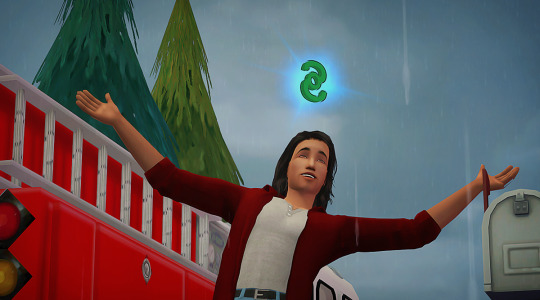

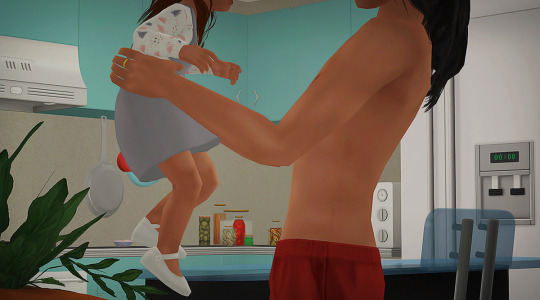
welcome back to signal hill for round 4! if you're not caught up, i closed out round 3 with a compilation post.
over at the bishop household, erik got a promotion at his job as a firefighter. isabel is growing well and is spoiled rotten by all the adults around her.
#simblr#ts2#the sims 2#sims 2#gameplay#hood: signal hill#signal hill 1.4#signal hill: bishop#signal hill: erik bishop#signal hill: hazel dunn#signal hill: isabel bishop
22 notes
·
View notes
Photo

Capital from Rome to Byzantium
The removal of the imperial capital from Rome to Byzantium was one of the most decisive acts on record — a signal monument of foresight, genius, and will. Madrid, St. Petersburg, Berlin, are also capital cities created by the act of a powerful ruler. But none of these foundations can compare in scale and in importance with the tremendous task of moving the seat of empire a thousand miles to the East, from the centre of Italy to the coast of Asia, from a Latin to a Greek city, from a pagan to a Christian population.
The motives which impelled Constantine to this momentous step were doubtless complex. Since the time of Trajan, Rome had not been the constant residence of the Emperors, except of Antoninus Pius, nor the regular seat of government. Since the time of Diocletian, Rome had been abandoned as the official centre of the empire. Many places east of it had been tried; and Constantine, when resolved on the great change, seriously contemplated two, if not three local ephesus tour guides, other sites. It had long been agreed that the imperial seat must be transferred towards the East; and there was an instinctive sense that the valley of the Tiber was no longer safe from the incessant onward march of the Teutonic nations in arms.
Asia Minor and the Euphrates
The tendency was to get somewhere south of the Danube, and within reach of Asia Minor and the Euphrates. The greater chiefs had all felt that the empire must be recast, both politically and spiritually. By the fourth century it was clear that the empire must break with the rooted prejudices that surrounded the Senate of Rome and the gods of the Capitol. And Constantine, the halfconscious and half-convinced agent of the great change — the change from the ancient world to the modern world, from polytheism to Christianity—saw in the Church and Bishop of Rome a power which would never be his creature. Dante tells us that ‘ Caesar became a Greek in order to give place to the Roman pastor.’ There is much in this: but it is not the whole truth, for Caesar might have become a Spaniard, or a Gaul, or an Illyrian. Dante might have added that Caesar became an Oriental, in order to give place to the Goth. Constantinople from the first was a Christian city, with an orthodox Church; but it was a Church that was, from the first, a department of the State.
The topography, apart from the geography of Constantinople, may demand some words; for the history of the city from Constantine to Abdul Hamid is based on its physical characters. We cannot doubt that the many delights of this spot, the varied resources of the surrounding country, the combination of sea, bay, mountain, valley, terrace, and garden, as these rise one beyond the other, have made Constantinople for fifteen centuries the residence of Emperors and Caliphs, the dream and pride of nations, and the crown of imperial ambition.
Those who approach Constantinople from Greece, as all men should, have sailed through that long panorama of island, mountain, and headland which the Aegean Sea presents, past ‘Troy town’ and the unknown home of its minstrel; and every rock recalls some tale or poem for the three thousand years since European thought and arts rose into being across those waters. The Hellespont has been passed with its legends and histories, and the sea of Marmora with its islands of marble, its rich shores and distant ranges of mountain — and as the morning sun touches the crescents on her domes, the eternal city of New Rome bursts into view, looking on the East and the South across the blue waters of Propontis and Bosphorus, with her seven hills rising towards Europe one behind the other, each crowned with cupola and minaret, amidst arcaded terraces, and groves of acacia, myrtle, and cypress.
0 notes
Photo

Capital from Rome to Byzantium
The removal of the imperial capital from Rome to Byzantium was one of the most decisive acts on record — a signal monument of foresight, genius, and will. Madrid, St. Petersburg, Berlin, are also capital cities created by the act of a powerful ruler. But none of these foundations can compare in scale and in importance with the tremendous task of moving the seat of empire a thousand miles to the East, from the centre of Italy to the coast of Asia, from a Latin to a Greek city, from a pagan to a Christian population.
The motives which impelled Constantine to this momentous step were doubtless complex. Since the time of Trajan, Rome had not been the constant residence of the Emperors, except of Antoninus Pius, nor the regular seat of government. Since the time of Diocletian, Rome had been abandoned as the official centre of the empire. Many places east of it had been tried; and Constantine, when resolved on the great change, seriously contemplated two, if not three local ephesus tour guides, other sites. It had long been agreed that the imperial seat must be transferred towards the East; and there was an instinctive sense that the valley of the Tiber was no longer safe from the incessant onward march of the Teutonic nations in arms.
Asia Minor and the Euphrates
The tendency was to get somewhere south of the Danube, and within reach of Asia Minor and the Euphrates. The greater chiefs had all felt that the empire must be recast, both politically and spiritually. By the fourth century it was clear that the empire must break with the rooted prejudices that surrounded the Senate of Rome and the gods of the Capitol. And Constantine, the halfconscious and half-convinced agent of the great change — the change from the ancient world to the modern world, from polytheism to Christianity—saw in the Church and Bishop of Rome a power which would never be his creature. Dante tells us that ‘ Caesar became a Greek in order to give place to the Roman pastor.’ There is much in this: but it is not the whole truth, for Caesar might have become a Spaniard, or a Gaul, or an Illyrian. Dante might have added that Caesar became an Oriental, in order to give place to the Goth. Constantinople from the first was a Christian city, with an orthodox Church; but it was a Church that was, from the first, a department of the State.
The topography, apart from the geography of Constantinople, may demand some words; for the history of the city from Constantine to Abdul Hamid is based on its physical characters. We cannot doubt that the many delights of this spot, the varied resources of the surrounding country, the combination of sea, bay, mountain, valley, terrace, and garden, as these rise one beyond the other, have made Constantinople for fifteen centuries the residence of Emperors and Caliphs, the dream and pride of nations, and the crown of imperial ambition.
Those who approach Constantinople from Greece, as all men should, have sailed through that long panorama of island, mountain, and headland which the Aegean Sea presents, past ‘Troy town’ and the unknown home of its minstrel; and every rock recalls some tale or poem for the three thousand years since European thought and arts rose into being across those waters. The Hellespont has been passed with its legends and histories, and the sea of Marmora with its islands of marble, its rich shores and distant ranges of mountain — and as the morning sun touches the crescents on her domes, the eternal city of New Rome bursts into view, looking on the East and the South across the blue waters of Propontis and Bosphorus, with her seven hills rising towards Europe one behind the other, each crowned with cupola and minaret, amidst arcaded terraces, and groves of acacia, myrtle, and cypress.
1 note
·
View note
Photo

Capital from Rome to Byzantium
The removal of the imperial capital from Rome to Byzantium was one of the most decisive acts on record — a signal monument of foresight, genius, and will. Madrid, St. Petersburg, Berlin, are also capital cities created by the act of a powerful ruler. But none of these foundations can compare in scale and in importance with the tremendous task of moving the seat of empire a thousand miles to the East, from the centre of Italy to the coast of Asia, from a Latin to a Greek city, from a pagan to a Christian population.
The motives which impelled Constantine to this momentous step were doubtless complex. Since the time of Trajan, Rome had not been the constant residence of the Emperors, except of Antoninus Pius, nor the regular seat of government. Since the time of Diocletian, Rome had been abandoned as the official centre of the empire. Many places east of it had been tried; and Constantine, when resolved on the great change, seriously contemplated two, if not three local ephesus tour guides, other sites. It had long been agreed that the imperial seat must be transferred towards the East; and there was an instinctive sense that the valley of the Tiber was no longer safe from the incessant onward march of the Teutonic nations in arms.
Asia Minor and the Euphrates
The tendency was to get somewhere south of the Danube, and within reach of Asia Minor and the Euphrates. The greater chiefs had all felt that the empire must be recast, both politically and spiritually. By the fourth century it was clear that the empire must break with the rooted prejudices that surrounded the Senate of Rome and the gods of the Capitol. And Constantine, the halfconscious and half-convinced agent of the great change — the change from the ancient world to the modern world, from polytheism to Christianity—saw in the Church and Bishop of Rome a power which would never be his creature. Dante tells us that ‘ Caesar became a Greek in order to give place to the Roman pastor.’ There is much in this: but it is not the whole truth, for Caesar might have become a Spaniard, or a Gaul, or an Illyrian. Dante might have added that Caesar became an Oriental, in order to give place to the Goth. Constantinople from the first was a Christian city, with an orthodox Church; but it was a Church that was, from the first, a department of the State.
The topography, apart from the geography of Constantinople, may demand some words; for the history of the city from Constantine to Abdul Hamid is based on its physical characters. We cannot doubt that the many delights of this spot, the varied resources of the surrounding country, the combination of sea, bay, mountain, valley, terrace, and garden, as these rise one beyond the other, have made Constantinople for fifteen centuries the residence of Emperors and Caliphs, the dream and pride of nations, and the crown of imperial ambition.
Those who approach Constantinople from Greece, as all men should, have sailed through that long panorama of island, mountain, and headland which the Aegean Sea presents, past ‘Troy town’ and the unknown home of its minstrel; and every rock recalls some tale or poem for the three thousand years since European thought and arts rose into being across those waters. The Hellespont has been passed with its legends and histories, and the sea of Marmora with its islands of marble, its rich shores and distant ranges of mountain — and as the morning sun touches the crescents on her domes, the eternal city of New Rome bursts into view, looking on the East and the South across the blue waters of Propontis and Bosphorus, with her seven hills rising towards Europe one behind the other, each crowned with cupola and minaret, amidst arcaded terraces, and groves of acacia, myrtle, and cypress.
0 notes
Photo

Capital from Rome to Byzantium
The removal of the imperial capital from Rome to Byzantium was one of the most decisive acts on record — a signal monument of foresight, genius, and will. Madrid, St. Petersburg, Berlin, are also capital cities created by the act of a powerful ruler. But none of these foundations can compare in scale and in importance with the tremendous task of moving the seat of empire a thousand miles to the East, from the centre of Italy to the coast of Asia, from a Latin to a Greek city, from a pagan to a Christian population.
The motives which impelled Constantine to this momentous step were doubtless complex. Since the time of Trajan, Rome had not been the constant residence of the Emperors, except of Antoninus Pius, nor the regular seat of government. Since the time of Diocletian, Rome had been abandoned as the official centre of the empire. Many places east of it had been tried; and Constantine, when resolved on the great change, seriously contemplated two, if not three local ephesus tour guides, other sites. It had long been agreed that the imperial seat must be transferred towards the East; and there was an instinctive sense that the valley of the Tiber was no longer safe from the incessant onward march of the Teutonic nations in arms.
Asia Minor and the Euphrates
The tendency was to get somewhere south of the Danube, and within reach of Asia Minor and the Euphrates. The greater chiefs had all felt that the empire must be recast, both politically and spiritually. By the fourth century it was clear that the empire must break with the rooted prejudices that surrounded the Senate of Rome and the gods of the Capitol. And Constantine, the halfconscious and half-convinced agent of the great change — the change from the ancient world to the modern world, from polytheism to Christianity—saw in the Church and Bishop of Rome a power which would never be his creature. Dante tells us that ‘ Caesar became a Greek in order to give place to the Roman pastor.’ There is much in this: but it is not the whole truth, for Caesar might have become a Spaniard, or a Gaul, or an Illyrian. Dante might have added that Caesar became an Oriental, in order to give place to the Goth. Constantinople from the first was a Christian city, with an orthodox Church; but it was a Church that was, from the first, a department of the State.
The topography, apart from the geography of Constantinople, may demand some words; for the history of the city from Constantine to Abdul Hamid is based on its physical characters. We cannot doubt that the many delights of this spot, the varied resources of the surrounding country, the combination of sea, bay, mountain, valley, terrace, and garden, as these rise one beyond the other, have made Constantinople for fifteen centuries the residence of Emperors and Caliphs, the dream and pride of nations, and the crown of imperial ambition.
Those who approach Constantinople from Greece, as all men should, have sailed through that long panorama of island, mountain, and headland which the Aegean Sea presents, past ‘Troy town’ and the unknown home of its minstrel; and every rock recalls some tale or poem for the three thousand years since European thought and arts rose into being across those waters. The Hellespont has been passed with its legends and histories, and the sea of Marmora with its islands of marble, its rich shores and distant ranges of mountain — and as the morning sun touches the crescents on her domes, the eternal city of New Rome bursts into view, looking on the East and the South across the blue waters of Propontis and Bosphorus, with her seven hills rising towards Europe one behind the other, each crowned with cupola and minaret, amidst arcaded terraces, and groves of acacia, myrtle, and cypress.
0 notes
Photo

Capital from Rome to Byzantium
The removal of the imperial capital from Rome to Byzantium was one of the most decisive acts on record — a signal monument of foresight, genius, and will. Madrid, St. Petersburg, Berlin, are also capital cities created by the act of a powerful ruler. But none of these foundations can compare in scale and in importance with the tremendous task of moving the seat of empire a thousand miles to the East, from the centre of Italy to the coast of Asia, from a Latin to a Greek city, from a pagan to a Christian population.
The motives which impelled Constantine to this momentous step were doubtless complex. Since the time of Trajan, Rome had not been the constant residence of the Emperors, except of Antoninus Pius, nor the regular seat of government. Since the time of Diocletian, Rome had been abandoned as the official centre of the empire. Many places east of it had been tried; and Constantine, when resolved on the great change, seriously contemplated two, if not three local ephesus tour guides, other sites. It had long been agreed that the imperial seat must be transferred towards the East; and there was an instinctive sense that the valley of the Tiber was no longer safe from the incessant onward march of the Teutonic nations in arms.
Asia Minor and the Euphrates
The tendency was to get somewhere south of the Danube, and within reach of Asia Minor and the Euphrates. The greater chiefs had all felt that the empire must be recast, both politically and spiritually. By the fourth century it was clear that the empire must break with the rooted prejudices that surrounded the Senate of Rome and the gods of the Capitol. And Constantine, the halfconscious and half-convinced agent of the great change — the change from the ancient world to the modern world, from polytheism to Christianity—saw in the Church and Bishop of Rome a power which would never be his creature. Dante tells us that ‘ Caesar became a Greek in order to give place to the Roman pastor.’ There is much in this: but it is not the whole truth, for Caesar might have become a Spaniard, or a Gaul, or an Illyrian. Dante might have added that Caesar became an Oriental, in order to give place to the Goth. Constantinople from the first was a Christian city, with an orthodox Church; but it was a Church that was, from the first, a department of the State.
The topography, apart from the geography of Constantinople, may demand some words; for the history of the city from Constantine to Abdul Hamid is based on its physical characters. We cannot doubt that the many delights of this spot, the varied resources of the surrounding country, the combination of sea, bay, mountain, valley, terrace, and garden, as these rise one beyond the other, have made Constantinople for fifteen centuries the residence of Emperors and Caliphs, the dream and pride of nations, and the crown of imperial ambition.
Those who approach Constantinople from Greece, as all men should, have sailed through that long panorama of island, mountain, and headland which the Aegean Sea presents, past ‘Troy town’ and the unknown home of its minstrel; and every rock recalls some tale or poem for the three thousand years since European thought and arts rose into being across those waters. The Hellespont has been passed with its legends and histories, and the sea of Marmora with its islands of marble, its rich shores and distant ranges of mountain — and as the morning sun touches the crescents on her domes, the eternal city of New Rome bursts into view, looking on the East and the South across the blue waters of Propontis and Bosphorus, with her seven hills rising towards Europe one behind the other, each crowned with cupola and minaret, amidst arcaded terraces, and groves of acacia, myrtle, and cypress.
0 notes